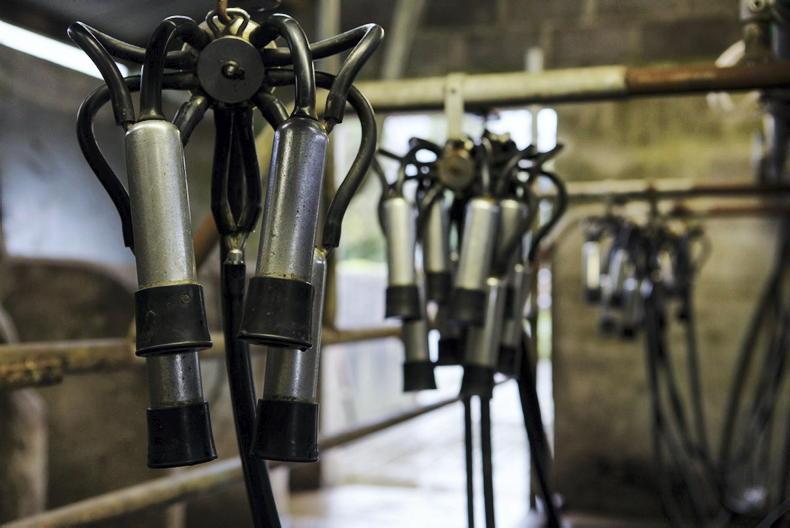Met Éireann has issued an alert for multi-hazard weather conditions as temperatures are set to reach as low as -5°C over the weekend.
To help overcome such challenging weather, the Department of Defence and the Office of Emergency Planning published the Be Winter Ready document.
Although the frosty cold weather has already begun, it is expected to only get colder with patches of sleet and snow falling over the next few days. Preparation is key to minimising disruption during severe weather and it is best to get started straight away.
The Irish Farmers Journal has complied the top tips to keep your farm safe and working during this cold period.
Access to water
Livestock will survive for a period of time without food but animals will show signs of dehydration if left longer than 24 hours without water.
The most vulnerable groups of animals to water shortage are milking cows, animals on high concentrate diets and animals fed hay, straw or other very dry feeds.
A cow producing 30 litres of milk and being fed a silage-based diet requires up to 90l (20 gallons) of water/day.
Concentrate feeding levels should be reduced and animals put on wet silage fed to appetite, where an adequate water supply cannot be provided.
If access of livestock to water has been restricted and then suddenly made available, over-drinking or water toxicity can cause health problems and even fatalities in extreme cases. Allow gradual access to water initially, when animals are extremely thirsty.
Out-wintered stock
Cattle can cope with low temperatures provided they have plenty of feed. Even young calves are not seriously affected by low temperatures if they have shelter from chilling wind and driving snow/rain.
Water supply is a huge problem with outdoor stock. Surface ice needs to be broken twice per day.
Ewes in early and late pregnancy have higher energy requirements than those in mid-pregnancy and should get a supply of forage (hay or silage) and about 0.5 kg meal/day where there is a blanket of snow and no grass available.
Frozen milking machines
Make sure that all doors into the parlour are kept closed and allow the machine to run a little bit longer to ensure that all excess water is removed from the plant after the final rinse.
Farmers can also circulate a salt solution through the milking machine, having first made sure that all the detergent has been rinsed out of the plant
The solution is made by mixing half a kg of salt in 5 gallons of water. Salt will drop the freezing point of water but make sure to rinse before milking to remove salt traces.

A longer-term solution would be to close off the entrance to the parlour with plastic sheeting or insulating blanket to reduce the amount of freezing air getting in and to keep as much heat as possible inside.
Maintaining farm machinery
To keep your slurry scrapper in good condition, you should clear snow from outdoor scrapers at the entrance to the tank. Keep the ratchet mechanism and tracks free of frozen slurry.
Keep tractors in the shed when not in use and have adequate anti-freeze in the cooling system.
Also have batteries fully charged to cope with the extra demands of starting in freezing conditions.
Make sure that the pumps in your sprayers are fully drained and remove pressure gauges from sprayers and store away from frost.
Otherwise, put about 10 litres of anti-freeze mixture (33%) into the tank, pump it through all valves and pipe work by opening the appropriate valves.
Frozen water pipes
Where there is an on-farm supply from a deep well, the deep submersible pump should not freeze but pipes and fittings from the pump to the pressure tank and from there to the sheds need to be kept free of ice. Have a thermostatically controlled fan heater in the pump-house.
Water pipes to the shed should be underground and any exposed pipes should be insulated.

In very low temperatures, pipes have frozen at the entrance to the shed and inside the shed in the supply to the troughs. In such situations, even when thawed out they are likely to freeze again.
The supply pipe to the troughs could be extended on further out of the house to a tap which can be left to run at a low rate to keep water flowing where there is an on-farm supply source.
This option cannot be used if the water is supplied by the Local Authority or Group Scheme.
Transport problems
Large trucks have poor traction on icy, untreated roads and can get stuck on even modest inclines so consider if a truck might get stuck in your yard before ordering feed.
Alternatively, get a temporary supply by tractor and trailer or four-wheel drive vehicle.
The Irish Farmers Association (IFA) has also urged farmers to clear routes around farm buildings, stock up on gritting material and salt, and divert water from commonly used pathways to keep walkways and roadways safe.
Avoid wastage
Forage should be fed in a round feeder or behind a feed barrier to avoid wastage.
Meal should be fed in troughs or on a packed line of snow, this can be made by tractor or quad driving on the snow and forming packed lines.

Feed the concentrate, preferably as nuts on the packed lines of snow.
Forage crops
Heavily frosted brassica crops, such as kale and rape, if consumed at a high rate will cause scouring, digestive upsets and even death in severe situations.
Avoid feeding frosted beet, as it contains oxalic acid, which can be poisonous if consumed in large quantities.
Cover outdoor clamps of beet with straw and an old silage cover to prevent freezing and keep off fresh snowfalls.
Personal safety
There is increased risk of injury during severe weather conditions with most injuries resulting from slips and falls causing fractures and head injuries.
Make sure to clear a number of tracks around the farmyard and treat with de-icing salt.
In addition, herd out-wintered livestock during daylight hours and be back before nightfall but also make sure to bring a mobile phone when on these journeys.
IFA president Francie Gorman said farm families should take the necessary precautions around their farms over the next number of days, to get through the cold snap.
“Over the coming days and into next week, farm families will face challenges in carrying out their work. It is absolutely essential that farmers think of their own safety, and the safety of their families and their neighbours at this time.
“While farmers will want to care for their livestock, their priority should be their own safety. I would encourage everybody to check around their farmyard and farm and see what can be done to minimise the risks from sub-zero conditions.”
Read more
Weekend weather: windchills, frost and snow
Five tips to working through freezing temperatures
Met Éireann has issued an alert for multi-hazard weather conditions as temperatures are set to reach as low as -5°C over the weekend.
To help overcome such challenging weather, the Department of Defence and the Office of Emergency Planning published the Be Winter Ready document.
Although the frosty cold weather has already begun, it is expected to only get colder with patches of sleet and snow falling over the next few days. Preparation is key to minimising disruption during severe weather and it is best to get started straight away.
The Irish Farmers Journal has complied the top tips to keep your farm safe and working during this cold period.
Access to water
Livestock will survive for a period of time without food but animals will show signs of dehydration if left longer than 24 hours without water.
The most vulnerable groups of animals to water shortage are milking cows, animals on high concentrate diets and animals fed hay, straw or other very dry feeds.
A cow producing 30 litres of milk and being fed a silage-based diet requires up to 90l (20 gallons) of water/day.
Concentrate feeding levels should be reduced and animals put on wet silage fed to appetite, where an adequate water supply cannot be provided.
If access of livestock to water has been restricted and then suddenly made available, over-drinking or water toxicity can cause health problems and even fatalities in extreme cases. Allow gradual access to water initially, when animals are extremely thirsty.
Out-wintered stock
Cattle can cope with low temperatures provided they have plenty of feed. Even young calves are not seriously affected by low temperatures if they have shelter from chilling wind and driving snow/rain.
Water supply is a huge problem with outdoor stock. Surface ice needs to be broken twice per day.
Ewes in early and late pregnancy have higher energy requirements than those in mid-pregnancy and should get a supply of forage (hay or silage) and about 0.5 kg meal/day where there is a blanket of snow and no grass available.
Frozen milking machines
Make sure that all doors into the parlour are kept closed and allow the machine to run a little bit longer to ensure that all excess water is removed from the plant after the final rinse.
Farmers can also circulate a salt solution through the milking machine, having first made sure that all the detergent has been rinsed out of the plant
The solution is made by mixing half a kg of salt in 5 gallons of water. Salt will drop the freezing point of water but make sure to rinse before milking to remove salt traces.

A longer-term solution would be to close off the entrance to the parlour with plastic sheeting or insulating blanket to reduce the amount of freezing air getting in and to keep as much heat as possible inside.
Maintaining farm machinery
To keep your slurry scrapper in good condition, you should clear snow from outdoor scrapers at the entrance to the tank. Keep the ratchet mechanism and tracks free of frozen slurry.
Keep tractors in the shed when not in use and have adequate anti-freeze in the cooling system.
Also have batteries fully charged to cope with the extra demands of starting in freezing conditions.
Make sure that the pumps in your sprayers are fully drained and remove pressure gauges from sprayers and store away from frost.
Otherwise, put about 10 litres of anti-freeze mixture (33%) into the tank, pump it through all valves and pipe work by opening the appropriate valves.
Frozen water pipes
Where there is an on-farm supply from a deep well, the deep submersible pump should not freeze but pipes and fittings from the pump to the pressure tank and from there to the sheds need to be kept free of ice. Have a thermostatically controlled fan heater in the pump-house.
Water pipes to the shed should be underground and any exposed pipes should be insulated.

In very low temperatures, pipes have frozen at the entrance to the shed and inside the shed in the supply to the troughs. In such situations, even when thawed out they are likely to freeze again.
The supply pipe to the troughs could be extended on further out of the house to a tap which can be left to run at a low rate to keep water flowing where there is an on-farm supply source.
This option cannot be used if the water is supplied by the Local Authority or Group Scheme.
Transport problems
Large trucks have poor traction on icy, untreated roads and can get stuck on even modest inclines so consider if a truck might get stuck in your yard before ordering feed.
Alternatively, get a temporary supply by tractor and trailer or four-wheel drive vehicle.
The Irish Farmers Association (IFA) has also urged farmers to clear routes around farm buildings, stock up on gritting material and salt, and divert water from commonly used pathways to keep walkways and roadways safe.
Avoid wastage
Forage should be fed in a round feeder or behind a feed barrier to avoid wastage.
Meal should be fed in troughs or on a packed line of snow, this can be made by tractor or quad driving on the snow and forming packed lines.

Feed the concentrate, preferably as nuts on the packed lines of snow.
Forage crops
Heavily frosted brassica crops, such as kale and rape, if consumed at a high rate will cause scouring, digestive upsets and even death in severe situations.
Avoid feeding frosted beet, as it contains oxalic acid, which can be poisonous if consumed in large quantities.
Cover outdoor clamps of beet with straw and an old silage cover to prevent freezing and keep off fresh snowfalls.
Personal safety
There is increased risk of injury during severe weather conditions with most injuries resulting from slips and falls causing fractures and head injuries.
Make sure to clear a number of tracks around the farmyard and treat with de-icing salt.
In addition, herd out-wintered livestock during daylight hours and be back before nightfall but also make sure to bring a mobile phone when on these journeys.
IFA president Francie Gorman said farm families should take the necessary precautions around their farms over the next number of days, to get through the cold snap.
“Over the coming days and into next week, farm families will face challenges in carrying out their work. It is absolutely essential that farmers think of their own safety, and the safety of their families and their neighbours at this time.
“While farmers will want to care for their livestock, their priority should be their own safety. I would encourage everybody to check around their farmyard and farm and see what can be done to minimise the risks from sub-zero conditions.”
Read more
Weekend weather: windchills, frost and snow
Five tips to working through freezing temperatures












SHARING OPTIONS